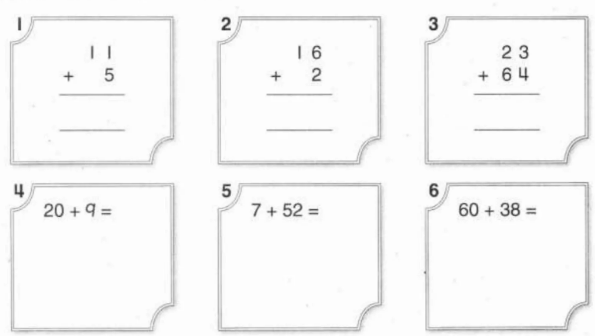1) 11 + 5 = ? 2) 16 + 2 = ? 3) 23 + 64 = ? 4) 20 + q = ? 5) 7 + 52 = ? 6) 60 + 38 = ?

Understand the Problem
The question presents a series of basic arithmetic addition problems that need to be solved. It involves simple addition calculations with the aim of finding the correct sums for each equation provided.
Answer
1. $16$ 2. $18$ 3. $87$ 4. $20 + q$ 5. $59$ 6. $98$
Answer for screen readers
- $16$
- $18$
- $87$
- $20 + q$ (result dependent on the value of ( q ))
- $59$
- $98$
Steps to Solve
-
Solve the first addition problem
In the first equation, we have:
$$ 11 + 5 = 16 $$ -
Solve the second addition problem
For the second equation:
$$ 16 + 2 = 18 $$ -
Solve the third addition problem
In the third equation we add:
$$ 23 + 64 = 87 $$ -
Solve the fourth problem (with variable)
Here we need to set the expression:
$$ 20 + q $$
If we want to find ( q ), we need to know the resulting value. -
Solve the fifth addition problem
For the fifth equation:
$$ 7 + 52 = 59 $$ -
Solve the sixth addition problem
In the last equation:
$$ 60 + 38 = 98 $$
- $16$
- $18$
- $87$
- $20 + q$ (result dependent on the value of ( q ))
- $59$
- $98$
More Information
These addition problems range from single-digit to double-digit sums, demonstrating basic arithmetic skills. The variable ( q ) in the fourth problem signifies that the result will depend on its value.
Tips
- Mistaking the order of operations. Remember that here we only have simple additions.
- Forgetting to carry over when dealing with double-digit addition.
AI-generated content may contain errors. Please verify critical information